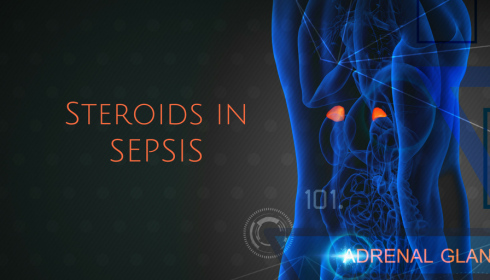TBL Top 10 for 2017

Wrapping Up 2017
Another year…
As we draw to the end of 2017, the editorial team and contributing authors would like to wish all our readers the very best over the festive period and a happy New Year.
The Bottom Line continues to grow. David, Steve and Duncan started in May 2014 and now there are 10 editors and over 20 contributing authors. The visitor statistics continue to amaze us with over a 1000 posts read on a daily basis. We believe this means we are providing useful, trusted, free, open access, educational content to healthcare providers, and we promise to continue delivering this into 2018.
Growing to keep up with demand…
We would like to take this opportunity to welcome Fraser Magee (@fraz65) to our editorial group.
Fraser has contributed several summaries already, and they’ve been consistently excellent. He works in Australia at the same hospital in Melbourne as two of our other editors, Chris Nickson and Aidan Burrell. He has a background in Emergency Medicine and Intensive Care.
The Best of 2017…
We held a poll within our editorial group, rating all 36 of the published trials from 2017 that we have summarised and critiqued. We considered the importance of the clinical question, how game changing the conclusion was for us, and how rigorous the trial conduct was. The ratings have been summed together to produce a rank, and here are our Top 10 for 2017 in reverse order.
10. TRICS 3
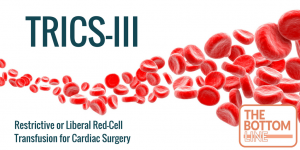
| Clinical Question | In patients undergoing cardiac surgery, who have a moderate-to-high risk of death, does a restrictive transfusion strategy compared with a liberal strategy impact on a composite outcome of death, myocardial infarction, stroke and acute kidney injury requiring dialysis | ||||
| Importance | 3.57 | Game Changing | 3.00 | Conduct | 4.00 |
| Overall Score | 10.57 | ||||
| Comment | This trial adds to the growing evidence that less is more when it comes to transfusion. One TBL editor commented “I’m a bit fed up of transfusion thresholds in cardiac, to be honest!”. | ||||
| Read the full TBL summary of the TRICS-3 trial | |||||
9. Seymour
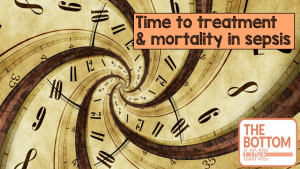
| Clinical Question | In patients with severe sepsis or septic shock, does a faster time to completion of a 3 hour bundle of care, compared with a slower time, affect in hospital mortality? | ||||
| Importance | 4.00 | Game Changing | 3.43 | Conduct | 3.14 |
| Overall Score | 10.57 | ||||
| Comment | This is a hugely topical issue, especially as national guidance and legislation has been formed from little evidence. The TBL editors thought this was a “superb analysis of actual practice” but added “correlation is not causation”. | ||||
| Read the full TBL summary of the Seymour trial | |||||
8. PRESERVE

| Clinical Question | In high-risk patients undergoing angiography, does the administration of bicarbonate and/or acetylcysteine, compared with placebo, prevent major adverse events and acute kidney injury? | ||||
| Importance | 4.00 | Game Changing | 3.57 | Conduct | 3.29 |
| Overall Score | 10.86 | ||||
| Comment | Contrast imaging is becoming more common, and perhaps contrast induced nephropathy is becoming less common thanks to newer strategies and contrast drugs. This trials adds to the evidence that less is more, again. One TBL editor commented that these interventions “lack biological plausibility”. | ||||
| Read the full TBL summary of the PRESERVE trial | |||||
7. DET02-AMI

| Clinical Question | In patients with suspected myocardial infarction with no baseline hypoxia, does oxygen therapy or room air improve all-cause mortality at 1 year? | ||||
| Importance | 3.86 | Game Changing | 3.86 | Conduct | 3.29 |
| Overall Score | 11.01 | ||||
| Comment | Once again, less is more. This trial “challenges one of the most fundamental laws of critical care”. | ||||
| Read the full TBL summary of the DETO2X-AMI trial | |||||
6. ATHOS-3
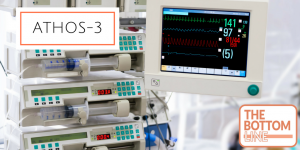
| Clinical Question | In patients with refractory vasodilatory shock does the addition of angiotensin II improve blood pressure compared with standard vasopressor therapy? | ||||
| Importance | 4.00 | Game Changing | 3.14 | Conduct | 4.00 |
| Overall Score | 11.14 | ||||
| Comment | This was a very well designed trial but not powered to detect clinically meaningful and patient-centred outcomes. “Angiotensin is coming soon… It helps the numbers, but will it help the patients?” | ||||
| Read the full TBL summary of the ATHOS-3 trial | |||||
5. TRANSFUSE

| Clinical Question | In critically ill patients requiring transfusion, does the transfusion of the freshest available red cells compared to standard care impact on patient mortality? | ||||
| Importance | 3.57 | Game Changing | 3.29 | Conduct | 4.29 |
| Overall Score | 11.15 | ||||
| Comment | This was a “meticulous study that puts to rest the idea that ‘fresh is best’ in the critically ill”. | ||||
| Read the full TBL summary of the TRANSFUSE trial | |||||
4. ICE-CUB 2

| Clinical Question | In critically ill patients aged over 75 years, does a recommendation for systematic ICU admission compared with standard care reduce 6 month mortality? | ||||
| Importance | 4.29 | Game Changing | 3.14 | Conduct | 3.86 |
| Overall Score | 11.29 | ||||
| Comment | Although this was a complex trial with some potential biases in the methodology, it has investigated a very important topic. “This has made me re-think the ‘admit more elderly to ICU’ position that I used to have” said one TBL editor. | ||||
| Read the full TBL summary of the ICE-CUB 2 trial | |||||
3. INPRESS
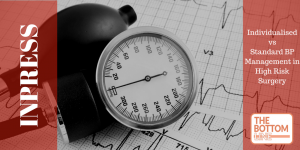
| Clinical Question | In high-risk patients undergoing surgical procedures, does a strategy of targeting individualised systolic blood pressure compared to standard practice reduce organ dysfunction? | ||||
| Importance | 3.86 | Game Changing | 4.00 | Conduct | 3.71 |
| Overall Score | 11.57 | ||||
| Comment | With an NNT 8, this trial should really make us think about our patients’ individual ideal intra-operative blood pressure. However, perhaps “‘standard care’ was below standard and so not a fair comparison” and as the Fragility Index was 3 maybe the conclusion is not so certain. | ||||
| Read the full TBL summary of the INPRESS trial | |||||
2. ART

| Clinical Question | In patients with moderate to severe acute respiratory distress syndrome (ARDS) does use of a lung recruitment maneuver associated with positive end-expiratory pressure (PEEP) titration according to the best respiratory-system compliance, compared with a conventional low-PEEP strategy, decrease 28-day mortality? | ||||
| Importance | 4.14 | Game Changing | 3.86 | Conduct | 3.71 |
| Overall Score | 11.71 | ||||
| Comment | One TBL editor said, “fascinating study – a real eye-opener and a challenge to those of us who were open lung disciples” whilst another described this as “game changing for me”. | ||||
| Read the full TBL summary of the ART trial | |||||
1. SSSP2

| Clinical Question | In Zambian adults with sepsis and hypotension, does a resuscitation protocol implemented early after presentation to the Emergency Department improve in-hospital mortality compared with usual care? | ||||
| Importance | 4.71 | Game Changing | 3.43 | Conduct | 3.86 |
| Overall Score | 12.00 | ||||
| Comment | We’ve chosen this as the best trial of 2017.
“Multiple flaws yet incredibly important trial” wrote one TBL editor. Another described it as “a fascinating follow up to FEAST” and added “the time is now right for well designed studies of aggressive resuscitation strategies in developed countries”. Perhaps our early resuscitation strategies are harmful but we have the resources to manage the consequences. Ben Andrews and colleagues should be commended for conducting well designed research in a resource poor country. |
||||
| Read the full TBL summary of the SSSP2 trial | |||||

